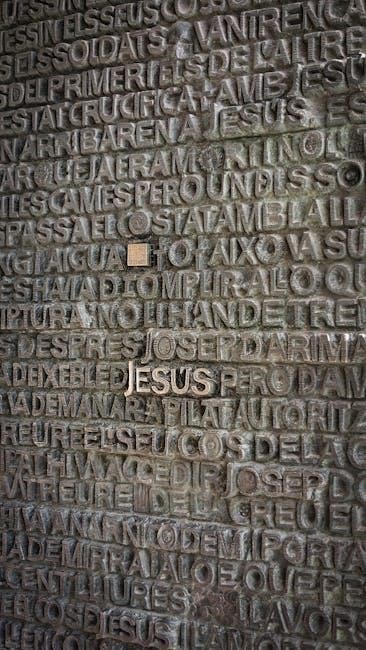The Ancient Christian Commentary on Scripture (ACCS) is a groundbreaking series that compiles insights from early Church Fathers, revitalizing Christian study and preaching through timeless exegesis.
Overview of the Ancient Christian Commentary on Scripture (ACCS)
The Ancient Christian Commentary on Scripture (ACCS) is a monumental series that gathers writings from early Church Fathers to provide insights into biblical texts. Organized canonically, it employs the Revised Standard Version (RSV) for clarity and consistency. Each volume compiles extracts from patristic sources, offering a window into how early Christians interpreted Scripture. This project aims to revitalize Christian teaching by reconnecting modern study with classical exegesis. By bridging ancient and modern scholarship, the ACCS equips preachers, teachers, and scholars with rich theological perspectives. It also encourages laypersons to engage deeply with Scripture through the lens of the early church, fostering a deeper understanding of the biblical text and its enduring relevance; The ACCS is a vital resource for anyone seeking to study Scripture in harmony with the wisdom of the past.
Historical Context and Significance
The Ancient Christian Commentary on Scripture (ACCS) emerges from a rich historical tradition of early Christian exegesis. It draws on writings from the Church Fathers, whose interpretations shaped Christian doctrine and practice. These fathers, such as Augustine and John Chrysostom, offered profound insights into Scripture, blending theological depth with pastoral wisdom. The ACCS preserves this legacy, making it accessible to modern readers. By reviving these classical commentaries, the series counters contemporary biblical scholarship’s tendency to overlook the early church’s contributions. This historical restoration fosters a more holistic understanding of Scripture, bridging the gap between ancient and modern Christian thought. The ACCS thus becomes a vital tool for reconnecting with the theological roots of Christianity, ensuring that the wisdom of the past continues to inform present-day faith and practice.

Structure and Organization of the Commentary
The Ancient Christian Commentary on Scripture is canonically arranged, using the Revised Standard Version (RSV), and features catena commentary, weaving together early Church Fathers’ insights for deeper biblical understanding.
Canonical Arrangement of the Text
The Ancient Christian Commentary on Scripture (ACCS) is meticulously organized according to the canonical order of the Bible, ensuring a cohesive and structured approach to studying Scripture. Each volume corresponds to a specific book of the Bible, maintaining the traditional sequence of the Christian canon. This arrangement allows readers to engage with the text in its historical and theological context, aligning with how the early Church Fathers interpreted Scripture. The commentary draws from a wide range of patristic writings, presenting them in a clear and accessible manner. By adhering to the canonical structure, the ACCS enables scholars and laypersons alike to explore the richness of early Christian exegesis while maintaining fidelity to the biblical text. This method also facilitates a deeper understanding of how the Church Fathers viewed Scripture as a unified and inspired whole.
Use of the Revised Standard Version (RSV)
The Ancient Christian Commentary on Scripture (ACCS) utilizes the Revised Standard Version (RSV) of the Bible in its print editions, ensuring a balance between modern readability and faithfulness to ancient texts. The RSV, known for its clarity and linguistic accuracy, provides a reliable foundation for the commentary’s exploration of early Christian interpretations. This choice allows readers to engage with Scripture in a version that bridges the gap between contemporary understanding and the historical insights of the Church Fathers. The RSV’s precision complements the patristic writings, offering a cohesive and accessible resource for both scholars and general readers. By employing this widely respected translation, the ACCS enhances the study of Scripture, making the voices of the early Church resonate clearly in modern times.
Key Contributors and Church Fathers
John Chrysostom, Augustine, Origen, and Cyril of Alexandria are prominent contributors, offering profound insights into Scripture through their homilies and interpretations, enriching the ACCS with timeless theological wisdom.
John Chrysostom and His Homilies on John

John Chrysostom, a renowned Church Father, is celebrated for his eloquent homilies that profoundly explore the Gospel of John. His works emphasize Christ’s humanity and humility, offering deep theological insights. Chrysostom’s homilies are included in the Ancient Christian Commentary on Scripture, providing invaluable perspectives that enrich modern biblical study and preaching. His commentary underscores the significance of Christ’s condescension, making His divine nature accessible to humanity. Chrysostom’s contributions remain instrumental in revitalizing Christian teaching and fostering a deeper understanding of Scripture through his engaging and insightful interpretations.
Augustine and His Interpretations of Scripture
Augustine, one of the most influential Church Fathers, contributed significantly to the Ancient Christian Commentary on Scripture (ACCS). His interpretations of Scripture, particularly in works like his homilies and theological treatises, are renowned for their depth and clarity. Augustine’s approach often emphasized the unity of the Old and New Testaments, highlighting Christ as the fulfillment of biblical prophecy. His commentaries, featured prominently in the ACCS, provide rich theological insights, blending exegetical precision with spiritual reflection. Augustine’s writings continue to inspire modern scholars and pastors, offering a balanced approach to understanding Scripture. His work remains a cornerstone of the ACCS, demonstrating the enduring relevance of classical Christian exegesis in contemporary study and preaching.

Historical Development of the Commentary
The ACCS evolved through centuries, compiling early Church Fathers’ writings to provide theological insights; Its development bridged ancient scholarship with modern study, enriching Christian understanding.

The Process of Compiling Early Church Writings
The process of compiling early Church writings for the ACCS involved meticulous research and selection of texts from Church Fathers. Scholars reviewed extensive patristic literature, ensuring a diverse representation of voices and interpretations. The writings were carefully chosen to reflect the theological richness and depth of early Christian thought. Each selected text was translated and contextualized to maintain its original meaning while making it accessible to modern readers. The compilation aimed to preserve the historical and doctrinal integrity of the sources, providing a comprehensive overview of early Christian exegesis. This painstaking process ensured that the ACCS became a vital resource for understanding Scripture through the lens of the early Church.
Thomas C. Oden’s Role in the ACCS Project

Thomas C. Oden, a renowned theologian and scholar, played a pivotal role as the general editor of the Ancient Christian Commentary on Scripture (ACCS). His vision was to reconnect modern Christianity with its ancient roots by compiling the wisdom of early Church Fathers. Oden oversaw the selection and translation of patristic texts, ensuring their theological depth and relevance were preserved. He collaborated with scholars to present these writings in a way that bridged the gap between ancient exegesis and contemporary understanding. Oden’s leadership ensured the ACCS became a resource for renewing Christian preaching and stimulating theological scholarship, fostering a deeper engagement with Scripture through the insights of the early Church.
Relevance and Application in Modern Christian Study
The ACCS bridges ancient insights with modern study, offering scholars and laypersons a rich resource for understanding Scripture through early Church Fathers’ perspectives.
Renewal of Christian Preaching and Teaching
The Ancient Christian Commentary on Scripture (ACCS) serves as a vital tool for renewing Christian preaching and teaching by reconnecting modern audiences with the rich exegetical traditions of the early Church Fathers. By compiling these ancient insights, the ACCS provides preachers and educators with a deep well of spiritual wisdom, enabling them to craft sermons and lessons that resonate with both historical and contemporary contexts. This resource not only revitalizes the pulpit but also equips believers to engage Scripture with a deeper understanding of its historical interpretation. The ACCS fosters a renewed appreciation for the timeless relevance of biblical teachings, bridging the gap between past and present to inspire transformative faith and practice in today’s Church.
Stimulation of Biblical and Theological Scholarship
The Ancient Christian Commentary on Scripture (ACCS) plays a pivotal role in stimulating biblical and theological scholarship by providing unparalleled access to the writings of early Church Fathers. Scholars gain insights into how these luminaries interpreted Scripture, fostering deeper theological exploration and encouraging fresh perspectives on classical texts. The ACCS bridges the gap between ancient and modern scholarship, enabling researchers to engage with diverse hermeneutical traditions and enrich their understanding of biblical theology. By presenting these resources in an organized and accessible format, the ACCS becomes an indispensable tool for academics, promoting rigorous study and fostering a renewed commitment to scriptural and theological inquiry. This stimulation of scholarship ensures that the legacy of early Christian thought continues to inform and inspire contemporary theological discourse.




